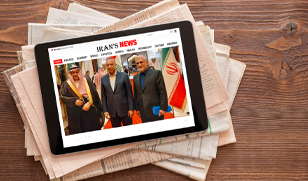 2022 / 04 / May
2022 / 04 / May
The fifth round of Iranian-Saudi negotiations in Baghdad
( In the Iranian press )
Prepared by Mohamed Mostafa Maash
Iran and Saudi Arabia have resumed dialogue in Baghdad after a months-long hiatus, with a meeting this week as part of efforts to improve severed ties.
The spokesman for the Iraqi Ministry of Foreign Affairs, Ahmed Al-Sahaf, told the Iraqi News Agency "INA" that "Iraq hosted the fifth round of dialogues between Tehran and Riyadh, within the framework of Iraqi policy and the principle of establishing dialogues, and added that the atmosphere of negotiations prevailedcalm and there was a state of positivity and understanding.
Relations between the two influential powers in the Gulf region have been established since the beginning of 2016, but the two countries, which stand on opposite sides in various regional files, held four dialogue meetings during the past year with the aim of improving relations, hosted by Iraq and facilitated by its Prime Minister Mustafa Al-Kadhimi.
For its part, the Iranian news agency "Noor News" confirmed the holding of a new dialogue session for senior officials in the General Secretariat of Iran's Supreme National Security Council and the head of the Saudi intelligence service" who attended the meetings as full representatives of the two sides.
Noor News also published an unclear picture regarding the last meeting, in this photo Iraqi Prime Minister Mustafa Kazemi stands in the middle, with Khalid Al-Humaidan, head of the Saudi intelligence service, standing next to Saeed Irfani, deputy director of foreign policy and international security in the Supreme General Secretariat.
The meeting took place in a "positive atmosphere", which gives rise to "optimism about the resumption of bilateral relations", she said. She expected "a joint meeting between the foreign ministers of the two countries in the near future."
Qais Qureshi, a London-based political analyst, said in an interview with Iran's ILNA news agency:
The Vienna talks encouraged countries in the region to reach an understanding with Iran andRiyadh, the precondition casts a shadow over bilateral talks. He also said Gulf states have sought an understanding with Iran. "The Saudis, in their mind, believe that Iran can order its allies, like them, to tell Abdulrahman Mansour Hadi to go and carry out any order." They believe that this is Iran's behavior, and for example, Sardar Qaani can pick up the phone Sayed Abdulmalik tells al-Houthi that today you have to accept Saudi conditions because we negotiate and he listens. It took Riyadh a long time to realize that relations between Iran and its allies were not such as to expect Iran to end the Yemen war with a phone call in favor of the Saudis, and this was the biggest condition that overshadowed the atmosphere of understanding, so far during the talks.
He added: "Yemeni news indicates that both Ansar Allah and the Arab League should maintain the continuation of theceasefire, and that the Yemenis have conditions, only the end of the blockade, and Saudi Arabia's agreement to transport fuel through the port of Hodeidah, and Ansar Allah is keenon a lasting peace.
He added: "If this ceasefire continues, it may be a good ground for the resumption of relations or the start of negotiations at the highest level between Tehran and Riyadh, and my opinion is that if a ceasefire is established in Yemen, we will have Iranian-Saudi relations within two months.
The last meeting between the two sides dates back to September 2021. A fifth session was expected in March.
However, press reports at the time talked about an Iranian decision to "suspend" participation in the dialogue after Saudi Arabia executed dozens of people, including many Shiites, knowing that the official media in Tehran only said at the time that no date had been set for a new session.
In addition, Iraqi Foreign Minister Fuad Hussein expressed his hope during a visit to Tehran in mid-April, hoping that "we will reach other stages of this dialogue and move the dialogue from closed dialogues, secret dialogues or dialogues at the security level, to diplomatic dialogues and public dialogues."
"The dialogue included several files, including the security file," he said, adding that the two countries discussed the continuation of the ceasefire in Yemen and agreed to hold the next round of talks at the diplomatic level.
He pointed out that "Prime Minister Mustafa Al-Kazemi was present in the negotiations."
Iranian Foreign Ministry spokesman Saeed Khatibzadeh on Monday described his country's fifth round of talks with Saudi Arabia as "comprehensive, good and serious, but they have not yet reached the stage of real political dialogue."
Zadeh added, at a press conference: "If the negotiations with Saudi Arabia rise to the political level, we are likely to see rapid progress," according to the Iranian news agency "IRNA."
Theformer Tehran ambassador in Baghdad said that during last week'sIran-Saudi talks, the two sides agreed on a "roadmap for future talks."
Iraj Masjedi, Iran's former ambassador to Iraq, briefed Iranian media on the latest round of talks between Iran and Saudi Arabia to normalize relations, announcing a "bilateral agreement on a path for future talks," in response to a question about the reopening of the embassies. The two countries in Tehran and Riyadh said that "the process of future negotiations will determine whether the issue of reopening embassies will materialize or not, and this depends on the upcoming negotiations."
According to the IRNA news agency, Mr. Masjedi said: "In the last round of talks, it was important for the RAF parties to havean agreed framework for the future, and this is a positive benchmark that illuminates the future trajectory of" both sides. "
According to Mr. Masjedi, the two countries also agreed in last Thursday's talks on "bilateral measures and cooperation, such as the Hajj and the issue of the embassies of the two sides," and the third topic to be discussed in the talks, with Saudi Arabia, was "regional andinternational talks."
According to Axios, the fifth round of talks between senior security and intelligence officials from Iran and Saudi Arabia focused on two main challenges: the normalization of relations between the two countries and the Yemen war.
The report noted Tehran's insistence on restoring diplomatic relations and reopening embassies, saying that "Riyadh first called for more practical measures."
Axios claimed that Saudi Arabia had agreed to allow Air in to reopen its embassy in Riyadh, but only for activities related to the Jeddah-based Organization of Islamic Cooperation.
Axios also quoted an "informed source" of the Iran-Saudi talks in the region as telling the Amvajmedia website that the two sides decided to "send a delegation to the other country within the next thirty days to discuss the reopening of the two embassies."
During the talks, Saudi Arabia also agreed to allow some 40,000 Iranian pilgrims to enter the country to perform this year's hajj in July.
According to the report, officials from the Islamic Republic of Iran and Saudi Arabia will meet again in Baghdad in the "coming weeks."
According to Axios, the issue of the Yemen war has been one of the main priorities of Saudi Arabia in these negotiations. Iran's envoy called for a more positive role in facilitating the extension of the ceasefire agreement in Yemen.
The parties to Yemen's conflict agreed for the first time during the country's seven-year war to a two-month renewable ceasefire on April 4 (Ramadan 1); but reports indicate that despite the announcement of a ceasefire, the Iran-backed Houthis continuedtheir attacks in various parts of Yemen. At least 80 ceasefire violations as of last Tuesday.
At the end of his report, Axios pointed out that the current "constructive atmosphere" in the negotiations between Iran and Saudi Arabia dependslargely on progress on the Yemen file, i.e. extending the ceasefire and moving towards peace talks.

Muhammad Mustafa Maash